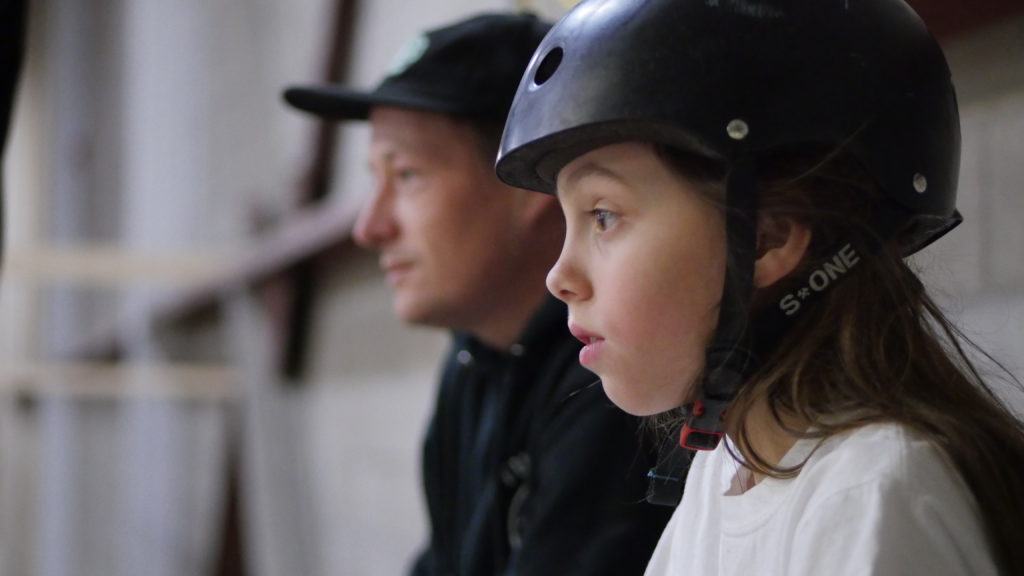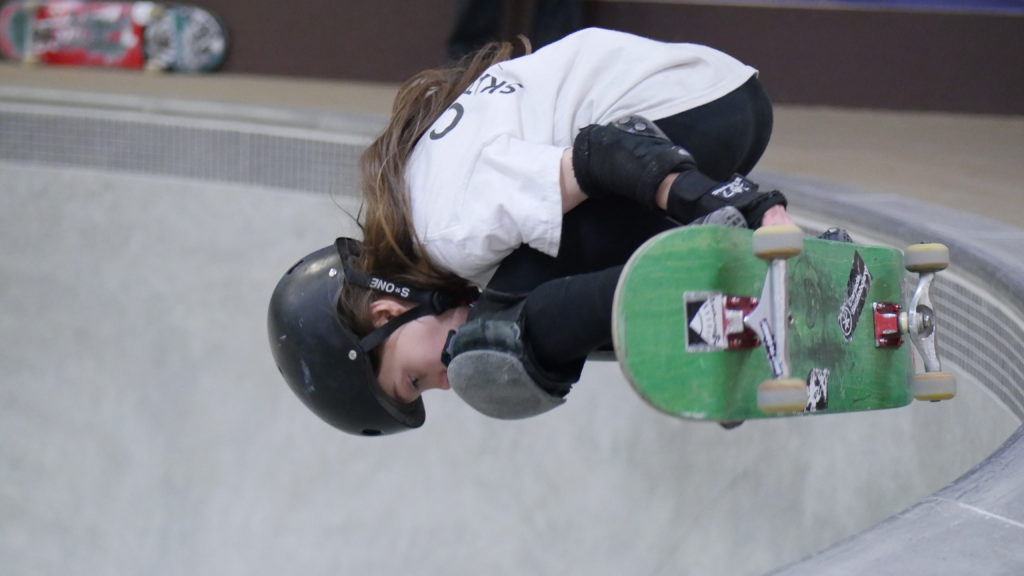
Emily Wilson |
Fay Ebert spends every minute she can at her local skatepark in Mississauga, sometimes skating for 11 hours straight. The commitment has earned her the nickname ‘Fay All Day” by fellow skaters. The small
but mighty girl soars through the air attempting to land that perfect trick with determination etched onto her face.
CJ’s skatepark is filled with male skaters in their early 20s zipping wildly around while Ebert stands out.
The reason? She’s only ten years old.
But being the only girl in a room full of guys also raises the question of where the other females are in the skateparks since it is very uncommon to see.
So why is that?

You may have heard of the Zephyr Boys, or maybe Z-Boys in the 1970s from films like Lords of Dogtown and Dogtown and Z-Boys. The group of young skaters were the original inventors of what we now know as aerial skateboarding born in the empty pools of West LA.
But one of the original group members was Peggy Oki, the only girl on the team and one of the few females who revolutionized skateboarding for women.
The Japanese/American skater, surfer, and environmental activist helped transform how women are viewed in sports by worrying less about how people perceived her and more of how she skated and presented herself.
Now, 50 years later, women are taking skateboarding by storm.
Female skate groups are a staple in many skate communities.
Groups like Skate Kitchen from New York City, the inspiration for the film of
the same name, and Nefarious Skate Crew out of London, U.K. are breaking the boundaries put into place a long time ago.
All are here to prove how skateboarding isn’t the bro lifestyle we always thought it was while diminishing the pot-smoking, high school dropout stigma.
Stephanie Battieste created Babes Brigade, a Toronto-based female skate crew, in 2015.
She had the idea to give girls a space where they can connect and find each other through social media.
It created a safe space for female ‘boarders’ so they could have fun without intimidation, which allowed girls to learn to skate in the carefree environment she had.
The loud and animated 33-year-old wanted to teach lessons to young girls and “inspire [them] to be confident in your skin,” she says.
Another female skate group out of Calgary was created for the same reason.
Erica Jacobs, a 39-year-old skater, wanted an inclusive space of encouragement.
She learned to skate with the intention of improving her snowboarding skills.
“I was just skating with my boyfriend and his dude friends,” she says,
and eventually found a few girls to enjoy her skate session with.
But over time, she wanted to find more girls to skate with, so she created the 100(%) Skate Club Facebook page which gained a lot of traction.
In the days when Jacobs was learning how to skate, there was only one skatepark available, Millennium Park in downtown Calgary.
It was once the largest skatepark in North America and had hosted pro
skaters like Tony Hawk. This made it difficult for her.
“Just to gain the courage to go there took me two years,” Jacobs says.
Twenty years have gone by and she is no longer intimidated as she shows up to the park with a crew of girls and is known by the community as a frequent skater in the scene.
But for others, it’s not so easy.
‘Bridging the gap’ for girls who aren’t as confident in their abilities was another of Jacobs’ goals in creating 100% Skate Crew.
“You no longer have to show up by yourself as a girl,” she says. They can join a whole group of girls and find encouragement in each other.
Jacobs considers her job a success if girls finally have the means to meet one another, not just having the safe space to skate.
A skatepark can be a very uneasy environment for beginner ‘boarders’, especially if they are female.
The setting of a skatepark can be uncomfortable for some, with skaters of higher skill levels and many male-dominated areas.
But Raelynn Pluecks, the Christie Pits Skatepark Coordinator and volunteer for the Toronto Skateboarding Committee, says, “it’s not the dudes doing it, it’s me doing it to myself,” which she thinks is what most women are facing of not knowing where they fit into the space.
This is where all-female skate groups and events are born – a collective space for women and girls to feel comfortable enough to try out tricks on their boards and learn how to navigate the chaotic environment, the 41-year-old says. After all, that is how women tend to learn naturally.
Pluecks says girls learn at a much different pace than boys.
“We’re more nurturers,” she says.
Girls tend to push each other with “more hand holding,” a setting that helped her learn how to skate five years ago.
There are many more femme girls showing up on the scene, rather than the more traditional tomboy who would have been seen at a park.
However, feminine skaters often get judged harder, but in this case, it’s more due to their looks.
“What they are wearing is being critiqued, rather than their actual
skateboarding,” Pleucks says. “They tend to get harsh reviews if they take on a feminine role.”
Being part of an all-female crew can help empower young girls who wish to learn but don’t feel they are tough enough, and social media can help that along, she explains.
Being the only girl in skateparks was never scary for Battieste.
She says she grew up with three brothers and no sisters, making her very comfortable around guys and being in that setting.
“I don’t think of it like I’m an outcast,” she says.
Many people in the industry around her are males, but she doesn’t let that get to her.
“Some guys don’t understand the need for [female groups],” Battieste says.
The discomfort for her comes from the feeling that the men “don’t understand what I am trying to do,” which sometimes feels
like she’s being judged.
This makes her fear for the future of skateboarding because women’s exposure may continue to still be seen as a trend, she says.
Battieste worries if the support from male skaters is going to continue in the
future.
Lately, the number of young female skaters is growing exponentially.
The way people now interact on the internet plays a role in how females are taking up sports and careers most often held by men.
Pluecks says it allows us to be more organized and easier to find.
Online platforms enable parks to launch skate events catered towards specific groups to become more diverse. It is now common to see skate events in the form of queer nights, ladies’ nights, and skate marches through the streets.
Pluecks suggests checking out Feminist Skaters TO on Facebook for many
local meet-ups.
The hard work that females have done previously has given young women chances to live their professional dream and has led to sprouting young athletes all over the world.
Sky Brown, an 11-year-old British/Japanese skater, and Rayssa Leal, a 12-year-old from Brazil are each competing for their spot
in an Olympic team and dominating competitions of all levels.
Fay Ebert herself has travelled twice to Brazil to compete in the world qualifiers and never feels different when she’s at the skatepark.

“I learn from [the guys] because they’re older than me and more
experienced,” she says.
Being a girl in a setting with a lot of guys doesn’t bother her at all.
“It just doesn’t matter,” she says. “There’s a difference, but there’s really not.”
Ebert even tends to look up more to the guys because their skate style is more how she wishes to skate herself.
“I like how powerful they are,” she says. “It looks good when they skate.”
“Fay All Day” is fearless in the park and it is clear she draws so much enjoyment from being on a board.
She would one day like to skate professionally but “if it doesn’t happen, it doesn’t happen.”
Jacobs loves how many kids are picking up the sport at such a young age.
She says it means parents are encouraging their daughters. Girls can see Sky Brown winning awards and major competitions and realize their dreams are achievable.
Jacobs also enjoys seeing how much bravery younger skaters have, which helps her continue to love what she does.
“It’s really the kids who are inspiring me,” she says with a laugh. “I can teach them every trick I know and next week they have seven more tricks!”
The strength of women is finally being seen across the globe and as more women pick up a skateboard, determined to diminish the “tough guy” stereotype, more of it shines through.
The popularity of skateboarding is ever-increasing and females are stamping their claim in participation, demanding a spot on the stage.
Strength and admiration lifts women with every trick eventually landed, while creating a sense of community, as women naturally do.
These female skate groups and meet-ups are vital and that’s why
they are doing so well.
Their founders are making skateboarding instil empowerment rather than the common scary perception of risk-taking and judgment.
So if you are considering grabbing a board and possibly making a fool out of yourself, go for it.
There will be plenty of girls by your side, encouraging you further and laughing with you.
As always, there’s power in numbers.